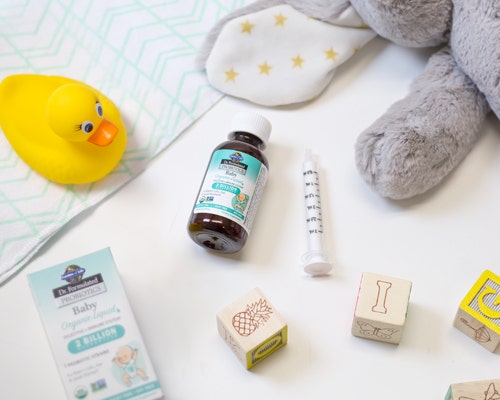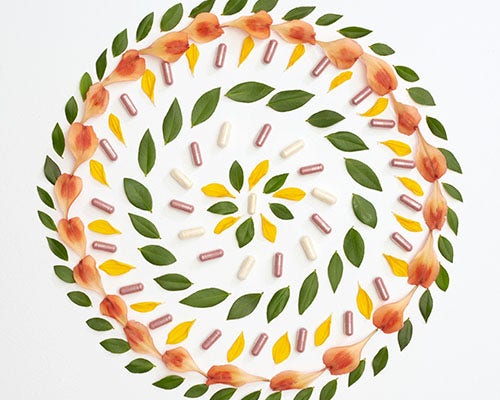Probiotics for Newborns and Infants
- 8/15/17

by David Perlmutter, M.D., Board-Certified Neurologist, #1 New York Times Best-Selling Author, Fellow of the American College of Nutrition
The science supporting the positive health effects of probiotic supplementation is expanding at an incredible rate. Just a couple of decades ago, we lived in a world where all bacteria were considered to be sources of potential threat to our health. Now we recognize that, by and large, the bacteria living upon us and within us are actually paving the way for us to have healthy lives. And it is this dramatic shift in how we view bacteria that explains the surge in probiotic usage as we learn more and more about their powerful health benefits.
More recently, scientific research has clearly recognized that our microbiome, the collection of microbes that call our bodies home, is highly influenced by early life events. For example, the well-defined health benefits associated with breast feeding are now thought to be related, in large part, to the effects of breast milk components, including bacteria, on the formation of baby’s gut microbiome.
Similarly, the long term health risks for children born by c-section as compared to vaginal birth are also thought to be related to detrimental effects upon the child’s microbiome.
This is why there’s been so much research recently looking at the effects of giving probiotics to newborns and infants. And the findings are hugely supportive.
For example, in a recent review of the published literature, Italian researchers concluded that administering probiotics to infants had a dramatic effect in terms of immunity. Their report showed an impressive reduction in skin allergic reactions in infants receiving probiotics compared to those who did not.
The probiotic organism, Lactobaccilus reuteri has been shown to be significantly effective as a treatment for infants with colic according to an in depth report from the Cleveland Clinic.
We now know that the infant’s microbiome actually helps direct brain development. This has long-term implications not only for brain health, but for functionality as well.
In a recent study of 75 children who were given a probiotic during the first 6 months of life, it was found that in comparison to children given a placebo in which 14% were diagnosed with either ADHD or a form of autism at age 14 years, not one of the children who took the probiotic developed either of these disorders.
But perhaps most importantly, as mentioned, the state of affairs of the infant’s microbiome sets the stage for the health of their gut bacteria for the rest of their lives. It’s now clear that early life events that affect the microbiome are associated with problems in adolescence and adulthood like obesity, type 1 diabetes, celiac disease, autism and ADHD.
So, helping ensure the vitality and diversity of your newborn’s microbiome provides a health advantage that quite literally will last a lifetime. And with this goal in mind, the most important considerations include:
The science supporting the positive health effects of probiotic supplementation is expanding at an incredible rate. Just a couple of decades ago, we lived in a world where all bacteria were considered to be sources of potential threat to our health. Now we recognize that, by and large, the bacteria living upon us and within us are actually paving the way for us to have healthy lives. And it is this dramatic shift in how we view bacteria that explains the surge in probiotic usage as we learn more and more about their powerful health benefits.
More recently, scientific research has clearly recognized that our microbiome, the collection of microbes that call our bodies home, is highly influenced by early life events. For example, the well-defined health benefits associated with breast feeding are now thought to be related, in large part, to the effects of breast milk components, including bacteria, on the formation of baby’s gut microbiome.
Similarly, the long term health risks for children born by c-section as compared to vaginal birth are also thought to be related to detrimental effects upon the child’s microbiome.
This is why there’s been so much research recently looking at the effects of giving probiotics to newborns and infants. And the findings are hugely supportive.
For example, in a recent review of the published literature, Italian researchers concluded that administering probiotics to infants had a dramatic effect in terms of immunity. Their report showed an impressive reduction in skin allergic reactions in infants receiving probiotics compared to those who did not.
The probiotic organism, Lactobaccilus reuteri has been shown to be significantly effective as a treatment for infants with colic according to an in depth report from the Cleveland Clinic.
We now know that the infant’s microbiome actually helps direct brain development. This has long-term implications not only for brain health, but for functionality as well.
In a recent study of 75 children who were given a probiotic during the first 6 months of life, it was found that in comparison to children given a placebo in which 14% were diagnosed with either ADHD or a form of autism at age 14 years, not one of the children who took the probiotic developed either of these disorders.
But perhaps most importantly, as mentioned, the state of affairs of the infant’s microbiome sets the stage for the health of their gut bacteria for the rest of their lives. It’s now clear that early life events that affect the microbiome are associated with problems in adolescence and adulthood like obesity, type 1 diabetes, celiac disease, autism and ADHD.
So, helping ensure the vitality and diversity of your newborn’s microbiome provides a health advantage that quite literally will last a lifetime. And with this goal in mind, the most important considerations include:
- Avoid c-section delivery unless absolutely necessary.
- Choose breast-feeding over the use of formula.
- Give your baby a comprehensive, broad-spectrum probiotic.





